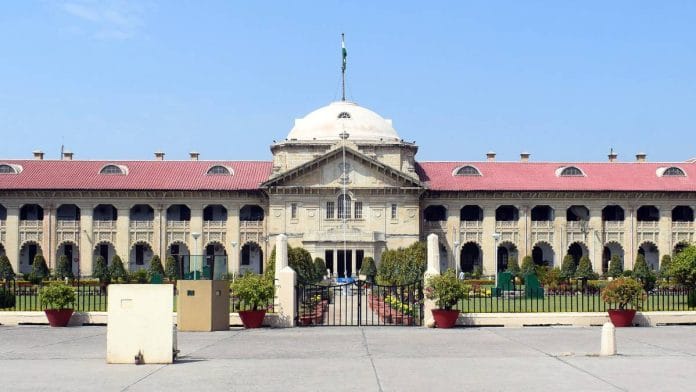New Delhi: The principle of consistency in judicial decisions is “fundamental” to maintaining “integrity and trust” in the legal system, the Allahabad High Court said in an anticipatory bail order.
Directing the release of the applicant, Abhishek Yadav, on bail, a single-judge bench of Justice Krishnan Pahal observed that consistency in orders ensures similar cases are treated alike. The judge overruled the trial court order that declined pre-arrest bail to Yadav, even as it had given relief to his co-accused in the case who faced similar charges.
Yadav had been charged in connection with an incident of physical assault under IPC sections of criminal intimidation and attempt to commit culpable homicide.
Justice Pahal accepted Yadav’s argument that judicial orders cannot treat accused differently when the allegations against them are similar in nature. He said the judicial order should not only be “fair and just” but must also be perceived as such by both the litigants and the public.
Asking for protection from arrest, Yadav had cited the two bail orders that the trial court gave in favour of his co-accused. He claimed that allegations in the FIR were general against the accused and no specific role was assigned to any of them, hence the trial court order rejecting his plea for anticipatory bail was wrong.
The prosecution too conceded that Yadav’s case is at par with the cases of the co-accused. They didn’t dispute that he was granted anticipatory bail during the pendency of the investigation and had not misused it.
Stressing upon consistency of judicial pronouncements, the HC said discriminatory practices by a judicial officer contraves “ethical standard” that is expected of the judiciary and amounts to “gross misconduct” that damages the “foundational principle of justice”.
The HC held that there was nothing to distinguish Yadav’s case from the other co-accused and that “inconsistency” in the matter raised “questions on the conduct of the judicial officer”. Hence, it said Yadav was entitled to anticipatory bail.
Consistency in judicial orders is directly related to fairness and impartial procedure, and for the faith of litigants, the fairness of the judicial proceedings is “pivotal”, Justice Pahal remarked.
As criminal proceedings arise as a challenge to state action and to protect an individual’s liberty, it becomes necessary that the courts do not subject the litigants to inconsistent orders, the bench noted, explaining that anything contrary to the settled principle of law would give rise to the theory that judicial decisions are not based on law and facts, but on personal biases.
Inconsistency, the judge said, arises when two matters have the same and identical facts and circumstances are subjected to two different orders, that too without specifying reasons for deviating.
The Court held that the failure to specify reasons for passing inconsistent orders make people think that the order has been passed for “extraneous considerations”. It highlighted that reasoned decisions are crucial since they provide transparency and enable the higher courts to review lower court decisions effectively.
The Court ruled that the judicial system rests on the “faith of the citizens” and is the “cornerstone of a democratic society”. This trust however, is eroded when judicial orders are inconsistent, creating an aura of bias. The citizens, along with the litigants, expect judicial orders to follow the law and fair procedure, and inconsistent orders can lead to discrimination among accused persons violating Article 14 (equality) of the Constitution, especially when the facts and circumstances are similar.
Uttkarsh Mishra is an intern with ThePrint.
(Edited by Gitanjali Das)






